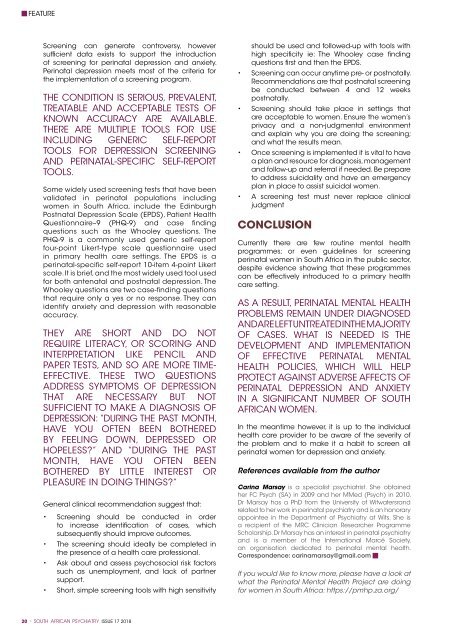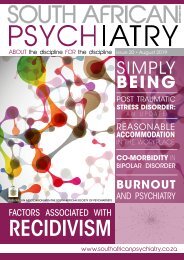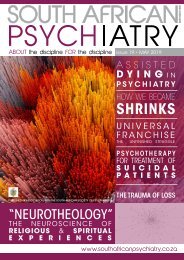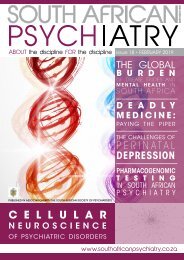South African Psychiatry - November 2018
South African Psychiatry - November 2018
South African Psychiatry - November 2018
Create successful ePaper yourself
Turn your PDF publications into a flip-book with our unique Google optimized e-Paper software.
FEATURE<br />
Screening can generate controversy, however<br />
sufficient data exists to support the introduction<br />
of screening for perinatal depression and anxiety.<br />
Perinatal depression meets most of the criteria for<br />
the implementation of a screening program.<br />
THE CONDITION IS SERIOUS, PREVALENT,<br />
TREATABLE AND ACCEPTABLE TESTS OF<br />
KNOWN ACCURACY ARE AVAILABLE.<br />
THERE ARE MULTIPLE TOOLS FOR USE<br />
INCLUDING GENERIC SELF-REPORT<br />
TOOLS FOR DEPRESSION SCREENING<br />
AND PERINATAL-SPECIFIC SELF-REPORT<br />
TOOLS.<br />
Some widely used screening tests that have been<br />
validated in perinatal populations including<br />
women in <strong>South</strong> Africa, include the Edinburgh<br />
Postnatal Depression Scale (EPDS), Patient Health<br />
Questionnaire–9 (PHQ-9) and case finding<br />
questions such as the Whooley questions. The<br />
PHQ-9 is a commonly used generic self-report<br />
four-point Likert-type scale questionnaire used<br />
in primary health care settings. The EPDS is a<br />
perinatal-specific self-report 10-item 4-point Likert<br />
scale. It is brief, and the most widely used tool used<br />
for both antenatal and postnatal depression. The<br />
Whooley questions are two case-finding questions<br />
that require only a yes or no response. They can<br />
identify anxiety and depression with reasonable<br />
accuracy.<br />
THEY ARE SHORT AND DO NOT<br />
REQUIRE LITERACY, OR SCORING AND<br />
INTERPRETATION LIKE PENCIL AND<br />
PAPER TESTS, AND SO ARE MORE TIME-<br />
EFFECTIVE. THESE TWO QUESTIONS<br />
ADDRESS SYMPTOMS OF DEPRESSION<br />
THAT ARE NECESSARY BUT NOT<br />
SUFFICIENT TO MAKE A DIAGNOSIS OF<br />
DEPRESSION: “DURING THE PAST MONTH,<br />
HAVE YOU OFTEN BEEN BOTHERED<br />
BY FEELING DOWN, DEPRESSED OR<br />
HOPELESS?” AND “DURING THE PAST<br />
MONTH, HAVE YOU OFTEN BEEN<br />
BOTHERED BY LITTLE INTEREST OR<br />
PLEASURE IN DOING THINGS?”<br />
General clinical recommendation suggest that:<br />
• Screening should be conducted in order<br />
to increase identification of cases, which<br />
subsequently should improve outcomes.<br />
• The screening should ideally be completed in<br />
the presence of a health care professional.<br />
• Ask about and assess psychosocial risk factors<br />
such as unemployment, and lack of partner<br />
support.<br />
• Short, simple screening tools with high sensitivity<br />
should be used and followed-up with tools with<br />
high specificity ie: The Whooley case finding<br />
questions first and then the EPDS.<br />
• Screening can occur anytime pre- or postnatally.<br />
Recommendations are that postnatal screening<br />
be conducted between 4 and 12 weeks<br />
postnatally.<br />
• Screening should take place in settings that<br />
are acceptable to women. Ensure the women’s<br />
privacy and a non-judgmental environment<br />
and explain why you are doing the screening;<br />
and what the results mean.<br />
• Once screening is implemented it is vital to have<br />
a plan and resource for diagnosis, management<br />
and follow-up and referral if needed. Be prepare<br />
to address suicidality and have an emergency<br />
plan in place to assist suicidal women.<br />
• A screening test must never replace clinical<br />
judgment<br />
CONCLUSION<br />
Currently there are few routine mental health<br />
programmes; or even guidelines for screening<br />
perinatal women in <strong>South</strong> Africa in the public sector,<br />
despite evidence showing that these programmes<br />
can be effectively introduced to a primary health<br />
care setting.<br />
AS A RESULT, PERINATAL MENTAL HEALTH<br />
PROBLEMS REMAIN UNDER DIAGNOSED<br />
AND ARE LEFT UNTREATED IN THE MAJORITY<br />
OF CASES. WHAT IS NEEDED IS THE<br />
DEVELOPMENT AND IMPLEMENTATION<br />
OF EFFECTIVE PERINATAL MENTAL<br />
HEALTH POLICIES, WHICH WILL HELP<br />
PROTECT AGAINST ADVERSE AFFECTS OF<br />
PERINATAL DEPRESSION AND ANXIETY<br />
IN A SIGNIFICANT NUMBER OF SOUTH<br />
AFRICAN WOMEN.<br />
In the meantime however, it is up to the individual<br />
health care provider to be aware of the severity of<br />
the problem and to make it a habit to screen all<br />
perinatal women for depression and anxiety.<br />
References available from the author<br />
Carina Marsay is a specialist psychiatrist. She obtained<br />
her FC Psych (SA) in 2009 and her MMed (Psych) in 2010.<br />
Dr Marsay has a PhD from the University of Witwatersrand<br />
related to her work in perinatal psychiatry and is an honorary<br />
appointee in the Department of <strong>Psychiatry</strong> at Wits. She is<br />
a recipient of the MRC Clinician Researcher Programme<br />
Scholarship. Dr Marsay has an interest in perinatal psychiatry<br />
and is a member of the International Marcé Society,<br />
an organisation dedicated to perinatal mental health.<br />
Correspondence: carinamarsay@gmail.com<br />
If you would like to know more, please have a look at<br />
what the Perinatal Mental Health Project are doing<br />
for women in <strong>South</strong> Africa: https://pmhp.za.org/<br />
20 * SOUTH AFRICAN PSYCHIATRY ISSUE 17 <strong>2018</strong>

















